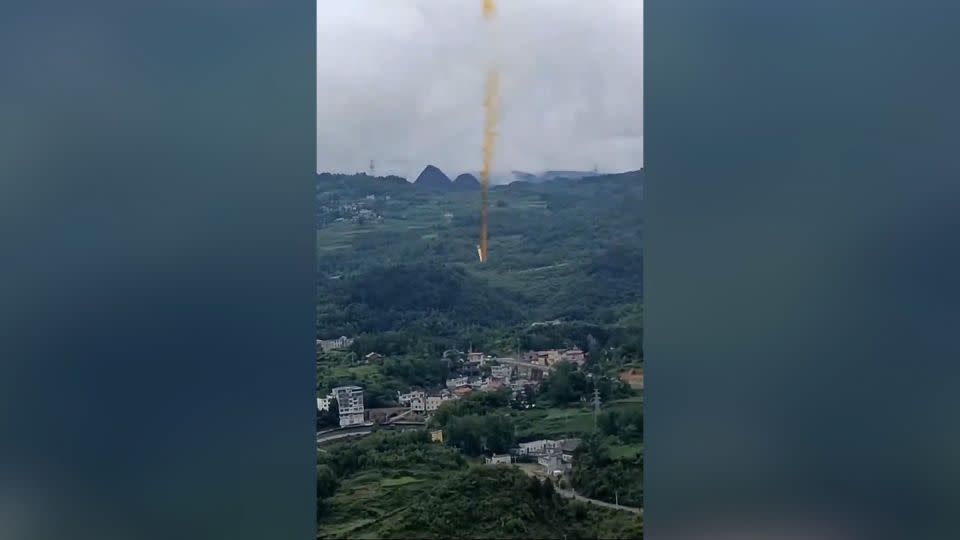Suspected debris from a Chinese rocket was seen falling to the ground over a village in southwestern China on Saturday, leaving a trail of bright yellow smoke and sending residents running, according to videos on Chinese social media and sent to CNN by a local witness.
The dramatic footage appeared online shortly after a Long March 2C carrier rocket took off at 3 p.m. local time Saturday (3 a.m. Eastern time) from the Xichang Satellite Launch Center in southwestern Sichuan province.
The rocket launched into orbit the Space Variable Objects Monitor, a powerful satellite developed by China and France to study the most distant explosion of stars known as the gamma-ray burst.
Chinese leader Xi Jinping has vowed to establish the country as a dominant space power, stepping up missions to compete with other major world powers, including the United States.
Saturday’s launch was declared a “total success” for China Aerospace Science and Technology Corporation (CASC), a state-owned contractor that developed the Long March 2C rocket.
CNN has contacted the CASC and the State Council Information Office, which handles press investigations targeting the Chinese government, including its space agency, for comment.
A video posted on Kuaishou, a Chinese short-video website, appeared to show a long, cylindrical piece of debris falling over a rural village and landing next to a hill, with yellow smoke billowing from one end.
CNN geolocated the video to be filmed in Xianqiao village in Guizhou province, neighboring the launch site in southeastern Sichuan province. The video was posted on Kuaishou from an IP address in Guizhou.
Other videos circulating on Chinese social media platforms reviewed by CNN showed various angles of the falling debris. In one of them, residents, including children, were seen running away while looking at the orange trail in the sky, with some covering their ears to the accident.
Some videos were removed on Monday afternoon.
Witnesses on social media said they heard a loud explosion after debris fell to the ground. An eyewitness told CNN that she saw the rocket land with “her own eyes.” “There was a strong smell and the sound of an explosion,” they added.
In a now-deleted government notice reposted by a local resident shortly after the launch, authorities said the city of Xinba, near the village of Xianqiao, would carry out a “rocket debris recovery mission” from 2:45 p.m. to 3:15 p.m. local time. . time on Saturday.
Residents were asked to leave their homes and other buildings an hour before launch and spread out to more open areas to watch the sky. They were warned to stay away from the wreckage to avoid damage from “toxic gas and explosion,” according to the warning.
Residents were also “strictly prohibited” from taking photos of the wreckage or “disseminating relevant videos online,” the notice said.
There were no immediate reports of injuries from local authorities.

‘Extremely toxic’
Markus Schiller, a rocket expert and senior research associate at the Stockholm International Peace Research Institute, said the debris appeared to be the first stage of the Long March 2C rocket, which uses a liquid propellant composed of nitrogen tetroxide and asymmetric dimethylhydrazine ( UDMH).
“This combination always creates these orange smoke trails. It is extremely toxic and carcinogenic,” Schiller said. “Every living thing that inhales this substance will face difficulties in the near future,” he added.
Such incidents often happen in China due to the location of its launch site, he said.
“If you want to launch something into low Earth orbit, you typically launch it in an easterly direction to get some extra thrust from the Earth’s rotation. But if you launch to the east, there will definitely always be some villages in the path of the first stage reinforcements.”
Most rockets in China are launched from the country’s three inland launch sites – Xichang in the southwest, Jiuquan in the Gobi Desert in the northwest, and Taiyuan in the north. Built during the Cold War, these bases were deliberately located far from the coast for security reasons.
In 2016, a fourth launch site, Wenchang, opened on Hainan Island, the country’s southernmost province.
By comparison, NASA and the European Space Agency typically launch their rockets from coastal locations toward the ocean, said Schiller, who is also director of ST Analytics in Munich, Germany.
Western space agencies have also largely eliminated the type of highly toxic liquid propellants from their civilian space programs that China – and Russia – still use, he added.
Multistage rockets launch debris shortly after liftoff, along trajectories that can be predicted before launch.
Before each launch, China’s civil aviation authority typically issues a warning to pilots, known as a NOTAM, to warn them against “temporary danger areas” where rocket debris is likely to fall.
Debris from Chinese rockets has hit villages before. In December 2023, rocket debris fell in southern Hunan province, damaging two homes, state media reported. In 2002, a boy in northern China was injured when debris from a satellite launch fell on his village in Shaanxi province.
“I hope we will see something like this for a long time, for many years,” Schiller said.
China has already faced criticism from the international space community for the way it handles the debris from its runaway rockets when they re-enter Earth.
In 2021, NASA criticized China for failing to “meet responsible standards” after debris from its out-of-control Long March 5B rocket plunged into the Indian Ocean, west of the Maldives, after re-entering the atmosphere.
CNN’s Joyce Jiang, Edward Szekeres and Steven Jiang contributed reporting.
For more news and newsletters from CNN, create an account at CNN.com


















/cdn.vox-cdn.com/uploads/chorus_asset/file/25521507/notepadspellcheck2.jpeg?w=300&resize=300,300&ssl=1)
















